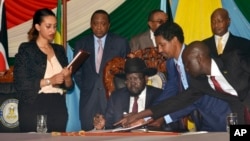South Sudanese President Salva Kiir on Wednesday added his signature to a peace deal aimed at ending more than 20 months of fighting between government forces and rebels led by his former deputy, Riek Machar.
But even as he signed the deal at a ceremony in the capital, Juba, Kiir expressed reservations about the terms of the peace agreement.
"The current peace we are signing today has so many things we have to reject," Kiir said to African leaders present at the signing. "Such reservations, if ignored, would not be in the interests of just and lasting peace."
The deal calls for Kiir to serve as president in a 30-month transitional government, and for Machar to be his second-in-command in the newly created position of first vice president.
Machar and former political detainee Pagan Amum signed the deal, brokered by an international mediation team known as IGAD-Plus, in Addis Ababa on August 17.
Machar said he signed the agreement even though he, too, disagreed with many of its provisions.
"I made 20 points of reservations on the peace agreement, but when I compared the reservations I had on the agreement to what we can get if we sign it -- we can get peace for South Sudan ... I think we can live with it," Machar told VOA after Kiir had signed the deal.
"Peace is more important to the people of South Sudan," Machar said.
The White House welcomed Kiir's signing of the deal, saying he had made "the right decision."
But White House spokesman Josh Earnest warned that the United States will only accept the agreement that was brokered by IGAD-Plus without "any reservations or addendums."
Kiir was at that signing ceremony in the Ethiopian capital when Machar and Amum signed the deal on August 17, but the president refused to add his name to the agreement. The government has explained that it objected to some of the provisions in the deal, including the power-sharing provisions and a plan to demilitarize Juba.
Kiir asked the IGAD-Plus mediation team for 15 days to consult with his inner circle and civil society groups before signing the deal. IGAD-Plus granted his request, but lead mediator Seyoum Mesfin said the deal that was signed by Machar and Amum on August 17 could not be changed.
Steve McDonald of the Washington-based Wilson Center said getting Kiir and Machar to work together at the head of a transitional government, as the deal provides for, might be a tall order.
"We still have a situation where both of the antagonists want as their final outcome to be president of South Sudan," Wilson said.
"The history that these two gentlemen have shown us in terms of their leadership -- I'm very cynical at this stage, unfortunately, given the history of these two, that this is going to hold," McDonald said.
Machar was sacked by President Kiir five months before South Sudan erupted in violence in December 2013.
President Kiir has insisted that the conflict in South Sudan was triggered when Machar launched an abortive coup against him on December 15, 2013. The international community has broadly rejected that theory and has said instead that the unrest began when soldiers loyal to Kiir and Machar clashed in Juba.
Amir Idris, the head of the department of African and African American Studies at Fordham University in New York, said the peace deal marks the beginning of a new chapter for South Sudan. Idris urged Kiir and Machar to seize the opportunity to show leadership and reunite the nation, which he says was fractured along ethnic lines during the conflict.
"The people of South Sudan have suffered a lot," Idris said. "It is now an opportunity for the political leaders to demonstrate to their own people that they are capable of providing a new vision that allows them to take South Sudan to a better future, a future where there's a language of justice, of freedom, of inclusivity for all the people of South Sudan."
The violence that broke out in Juba 20 months ago rapidly spread to nearly all of South Sudan's 10 states. Peace was restored within weeks in all the states but Jonglei, Unity and Upper Nile. Fighting was continuing as recently as this week in Upper Nile and Unity states, which are home to South Sudan's oil industry, the backbone of the nation's economy.
No official death toll has been released for the 20 months of fighting in South Sudan, but international NGOs and the United Nations have estimated that tens of thousands have been killed and millions face severe hunger because of the conflict.
More than 2.2 million South Sudanese have been forced from their homes by the fighting, and more than 800,000 of them have sought refuge in U.N. camps or in neighboring countries.
The fighting has also put development in South Sudan on hold and crippled the heavily oil-dependent economy of the world's newest nation.
Under the terms of the peace deal, fighting is supposed to stop within 72 hours. But there were reports of deadly clashes between government and opposition forces just hours before Kiir signed the agreement.
Prior to the agreement signed Wednesday, the warring sides in South Sudan signed and recommitted to peace more than half a dozen times. Each time, the deal was violated within hours and the country was plunged back into violence.




